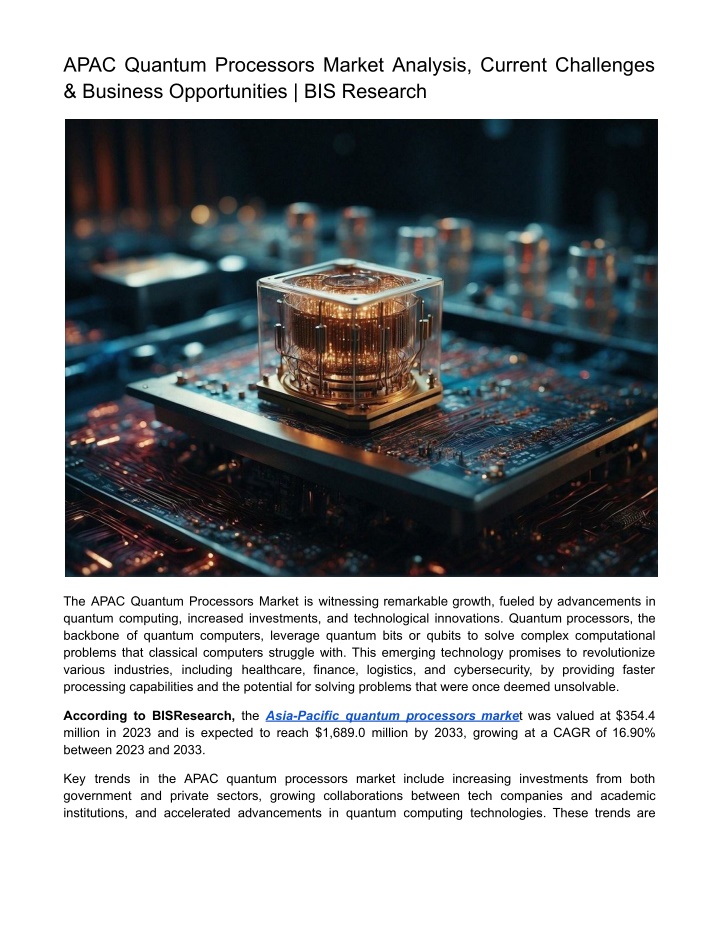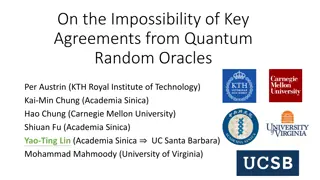
APAC Quantum Processors Market
The Asia-Pacific quantum processors market was valued at $354.4 million in 2023 and is expected to reach $1,689.0 million by 2033, growing at a CAGR of 16.90% between 2023 and 2033.nnRead Report Overview: //bisresearch.com/industry-report/asia-
Download Presentation

Please find below an Image/Link to download the presentation.
The content on the website is provided AS IS for your information and personal use only. It may not be sold, licensed, or shared on other websites without obtaining consent from the author. If you encounter any issues during the download, it is possible that the publisher has removed the file from their server.
You are allowed to download the files provided on this website for personal or commercial use, subject to the condition that they are used lawfully. All files are the property of their respective owners.
The content on the website is provided AS IS for your information and personal use only. It may not be sold, licensed, or shared on other websites without obtaining consent from the author.
E N D
Presentation Transcript
APAC Quantum Processors Market Analysis, Current Challenges & Business Opportunities | BIS Research The APAC Quantum Processors Market is witnessing remarkable growth, fueled by advancements in quantum computing, increased investments, and technological innovations. Quantum processors, the backbone of quantum computers, leverage quantum bits or qubits to solve complex computational problems that classical computers struggle with. This emerging technology promises to revolutionize various industries, including healthcare, finance, logistics, and cybersecurity, by providing faster processing capabilities and the potential for solving problems that were once deemed unsolvable. According to BISResearch, the Asia-Pacific quantum processors market was valued at $354.4 million in 2023 and is expected to reach $1,689.0 million by 2033, growing at a CAGR of 16.90% between 2023 and 2033. Key trends in the APAC quantum processors market include increasing investments from both government and private sectors, growing collaborations between tech companies and academic institutions, and accelerated advancements in quantum computing technologies. These trends are
driving innovation and speeding up the commercialization and adoption of quantum processors in the region. Key Drivers in the APAC Quantum Processors Market Government Support and Investments: Governments across the APAC region are actively promoting quantum computing as part of their national strategies. For instance, China has heavily invested in quantum research and has established itself as a global leader in the quantum space. The Chinese government s efforts in advancing quantum communication and quantum processors have been pivotal. Other APAC nations, including Japan and India, are following suit by increasing public funding and facilitating collaborations between academia and the private sector. Technological Advancements: The evolution of quantum technologies, particularly in quantum processors, has reached a stage where the scalability and reliability of qubits are steadily improving. Companies in APAC are working on developing more stable quantum processors by tackling challenges such as qubit decoherence and error rates. Progress in areas like superconducting qubits, trapped ions, and photonic qubits is expected to provide a significant boost to the market. Rising Demand for Quantum Computing Applications: Industries such as pharmaceuticals, automotive, and finance are increasingly exploring quantum computing for applications in areas like drug discovery, materials design, optimization problems, and cryptography. As quantum processors can process vast amounts of data faster than classical processors, their potential for optimizing supply chains, reducing energy consumption, and enhancing cybersecurity is attracting attention from both private enterprises and government sectors. Collaboration Between Private and Public Sectors: Many APAC countries are encouraging public-private partnerships to expedite the commercialization of quantum computing. Collaboration between universities, research institutes, and tech companies is fostering an ecosystem where quantum processors can be developed and tested for practical applications. These collaborations are also essential for addressing the high cost of quantum hardware, which remains a barrier for widespread adoption. Request A Detailed Sampleon the APAC Quantum Processors Market! APAC Quantum Processors Market by Application: Quantum Computing Cryptography Quantum Simulation Quantum Sensing and Metrology Market Outlook and Future Prospects The future of the APAC quantum processors market looks promising, with sustained growth expected in the coming years. As technology continues to mature, quantum processors are likely to become more accessible, with advancements in quantum error correction, quantum algorithms, and hardware reliability. The increasing adoption of quantum computing in sectors like healthcare, cybersecurity, and financial modeling will fuel demand for quantum processors.
Moreover, the rise of edge computing and AI in combination with quantum computing is expected to open up new applications for quantum processors, especially in the fields of machine learning, data analytics, and optimization problems. The APAC region s strong focus on technological innovation, coupled with the global race to lead in quantum computing, will likely ensure that quantum processors become a critical component of future computing systems. Key Players in the APAC Quantum Processors Market Toshiba Corporation Fujitsu Hitachi, Ltd. Get Insights on Electronics and Semiconductor Industry Conclusion The APAC Quantum Processors Market is poised for rapid growth, driven by significant investments in quantum research, increasing applications in various industries, and favorable government policies. Despite challenges related to high costs and technical limitations, the market's future looks bright as advancements in quantum hardware and software make quantum computing more accessible. As the region becomes a hub for quantum innovation, it is likely to play a pivotal role in shaping the future of computing globally.






















